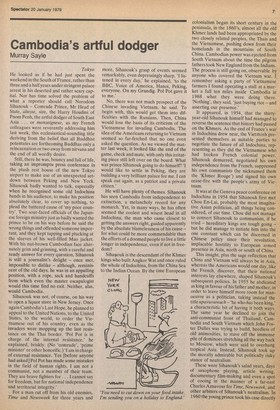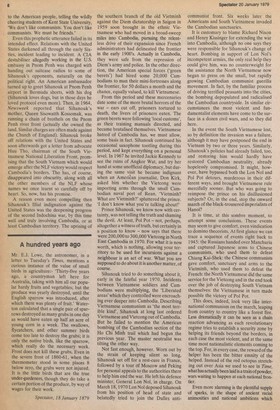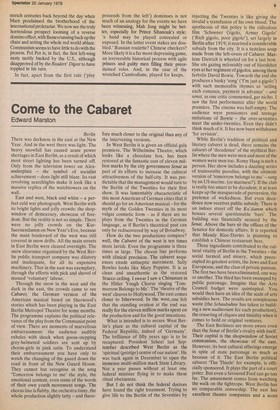Cambodia's artful dodger
Murray Sayle
Tokyo He looked as if he had just spent the weekend in the South of France, rather than three and a half years under stringent palace arrest in his deserted and rather scary capital. Nor has time solved the problem of what a reporter should call Norodom Sihanouk — Comrade Prince, Mr Head of State, altesse, sire, the Harry Houdini of Pnom Penh, the artful dodger of South East Asia . . . or monseigneur, as my French colleagues were reverently addressing him last week, this ecclesiastical-sounding title deriving from the belief that all Buddhist potentates are forthcoming Buddhas only a reincarnation or two away from nirvana and the end of all wordly desire.
Still, there he was, bouncy and full of life, taking an impromptu press conference in the plush rest house of the new Tokyo airport to make use of an unexpected setdown between Peking and New York. Sihanouk badly wanted to talk, especially when he recognised some old Indochina hands in his audience, to make his position absolutely clear, to cover up nothing, to plead the battered cause of 'my poor country'. Two sour-faced officials of the Japanese foreign ministry just as badly wanted the prince to be on his way before he said the wrong things and offended someone important, and they kept tapping and plucking at the sleeves of his well-filled Mao jacket. With his nut-brown Cambodian face alternately grim and grinning, with a careful and ready answer for every question, Sihanouk is still a journalist's delight — once met, impossible to dislike — although, reminiscent of the old days, he was in an appalling position, with a rope, sack and handcuffs from which even the master escapalogist would this time find no exit. Neither, alas, would Cambodia.
Sihanouk was not, of course, on his way to open a liquor stOre in New Jersey. Once again Cambodia's Last Hope, he planned to appeal to the United Nations, to the United States, to the world, to order the Vie tnamese out of his country, even as the invaders were mopping up the last resistance on the Thai border. 'Poi Pot is in charge of the internal resistance,' he explained, briskly. (No 'comrade', 'prime minister' or other honorific.) 'I am in charge of external resistance. Yes [before anyone had asked] Pol Pot has made some mistakes in the field of human rights. I am not a communist, not a member of their team. They are brave fighters for. . . I cannot say for freedom, but for national independence and territorial integrity.'
For a man cut off from his old enemies, Time and Newsweek for three years and more, Sihanouk's grasp of events seemed remarkably, even depressingly sharp. 'I listened in every day,' he explained, `to the BBC, Voice of America, Hanoi, Peking, everyone. On my Grundig. Pol Pot gave it to me.'
No, there was not much prospect of the Chinese invading Vietnam, he said. To begin with, this would get them into difficulties with the Russians. Then, China would lose the basis of its criticism of the Vietnamese for invading Cambodia. The idea of the Americans returning to Vietnam seemed so far-fetched that no one even asked the question. As we viewed the matter last week, it looked like the end of the game, check and mate, with only this irritating piece still left over on the board. What was prince Sihanouk going to do himself? 'I would like to settle in Peking, they are building a very brilliant palace for me. I can speak out again, as a patriot and a private citizen.'
He will have plenty of themes. Sihanouk has seen Cambodia from independence to extinction, a melancholy record for any monarch. Yet, in many ways, he has often seemed the coolest and wisest head in all Indochina, the man who came closest to getting the answers right, guided apparently by the absolute blamelessness of his cause — for what could be more commendable than the efforts of a doomed people to live a little longer in independence, even if not in freedom?
Sihauouk is the descendant of the Khmer kings who built Angkor Wat and once ruled the whole of Indochina, from the China Sea to the Indian Ocean. By the time European colonialism began its short century in the peninsula, in the 1860's, almost all the old Khmer lands had been appropriated by the two closely related peoples, the Thais and the Vietnamese, pushing down from their homelands in the mountains of South China. Cambodian power was ejected from South Vietnam about the time the pilgrim fathers took New Erigland from the Indians.
The process is still going on, observable by anyone who covered the Vietnam war. I remember asking a party of Vietnamese farmers I found operating a stall at a market a full ten miles inside Cambodia in 1968 what they were doing there.
'Nothing', they said, 'just buying rice — and asserting our presence.'
It appeared, in 1954, that the thirtyyear-old Sihanouk himself had managed to reverse the sentence that history had passed on the Khmers. As the end of France's war in Indochina drew near, the Vietminh presented themselves as suitable parties to negotiate the future of all Indochina, representing as they did the Vietnamese who had broken French colonial power. Sihanouk demurred, negotiated his own independence from the French, suppressed his own communists (he nicknamed them the 'Khmer Rouge') and signed his own cease-fire with the people's army of Vietnam.
It was at the Geneva peace conference on Indochina in 1954 that Sihanouk first met Chou En-Lai, probably the most imaginative Asian politician, all things being considered, of our time. Chou did not manage to convert Sihanouk to communism, if he tried — hereditary kings are tough going — but he did manage to initiate him into the one constant which can be discerned in Chinese policy since their revolution, implacable hostility to European armed presence in Asia, north or south of China.
This insight, plus the sage reflection that China and Vietnam will always be in Asia, whereas the Americans would one day, like the French, discover, that their national interests lay elsewhere, shaped Sihanouk's subsequent policies. In 1955 he abdicated as king in favour of his father and mother, in order to leave himself more room for manoeuvre as a politician, taking instead the title upavuvareach — 'he who has been king,' a characteristic bit of having it both ways. The same year he declined to join the anti-communist front of Thailand, Cambodia and South Vietnam which John Foster Dulles was trying to build, heedless of old animosities, to stave off the immense pile of dominoes stretching all the way back to Moscow, which were said to overhang tropical Asia. Instead, Sihanouk took up the morally admirable but politically risky stance of neutralism.
These were Sihanouk's salad years, days of saxophone playing, article writing, documentary film-making and even a spot of cooing in the manner of a far-east Charles Aznavour for Time, Newsweek, and other arbiters of Sihanouk's neutralism. In 1960 the young prince took his case directly to the American people, telling the wildly cheering students of Kent State University, 'We don't like communists. You don't like communists. We must be friends.'
Even this prophetic utterance failed in its intended effect. Relations with the United States darkened all through the early Sixties, incident leading to incident. A CIA destabiliser allegedly working in the U.S. embassy in Pnom Penh was charged with handing out suitcase radios to some of Sihanouk's opponents, naturally on the political right. An American ambassador turned up to greet Sihanouk at Pnom Penh airport in Bermuda shorts, with his dog (Sihanouk loves dogs, but in those days he loved protocol even more). Then, in 1964, Newsweek reported that Sihanouk's mother, Queen Sisowatth Kossomak, was running a chain of brothels on the Pnom Penh river front (actually she owned the land. Similar charges are often made against the Church of England). Sihanouk broke off relations with the United States and soon afterwards got a letter from advocate Huu 'Tho, chairman of the South Vietnamese National Liberation Front, promising that the South Vietnam which would emerge after the NLF victory would respect Cambodia's borders. Tho has, of course, disappeared into obscurity, along with all the other members of the NLF whose names we once learnt so carefully off by heart. So, now, has his promise.
A reason even more compelling then Sihanouk's filial indignation against the United States was the deepening progress of the second Indochina war, by this time well and truly involving Cambodia, or at least Cambodian territory. The uprising of the southern branch of the old Vietminh against the Diem dictatorship in Saigon in 1959 soon brought in the ethnic Vietnamese who had moved in a broad-sweep miles into Cambodia, pursuing the relentless drive of their expansion since French administrators had delineated the frontier in the early 1900's. Actually in Cambodia, they were safe from the repression of Diem's army and police. In the other direction, the American special forces ('green berets') had hired some 20,000 Cambodians to man their mini-fortresses along the frontier, for 50 dollars a month and the chance, equally valued, to kill Vietnamese.
From this period and these mercenaries date some of the more brutal horrors of the war — ears cut off, prisoners tortured to death, the livers of prisoners eaten. The green berets were following 'local customs', as their training manuals directed, and became brutalised themselves. Vietnamese hatred of Cambodia has, we must allow, some basis in fact. Sihanouk continued his occasional saxophone tootling during this period, and kept everything on a personal level. In 1967 he invited Jackie Kennedy to see the ruins of Angkor Wat, and try her hand at some unofficial diplomacy, but during the same visit he became indignant when an American journalist, Don Kirk, asked him whether the Vietcong were importing arms through the small Cambodian naval port of Rean. 'Vietminh? What are Vietminh?' spluttered the prince. 'I don't know what you're talking about!'
Prince Sihanouk, we know now with certainty, was not telling the truth and shaming the devil. At least, Pol Pot — not, perhaps, altogether a witness of truth, but certainly in a position to know — now says that there were 200,000 to 300,000 Vietcong in North East Cambodia in 1970. For what it is now worth, which is nothing, allowing your territory to be used for incursions against a neighbour is an act of war. What you are supposed to do about it is another matter, of course.
Sihanouk tried to do something about it, early in the fateful year 1970. Incidents between Vietnamese soldiers and Cambodians were multiplying, the 'Liberated areas' which they controlled were encroach ing ever deeper into Cambodia. Describing Vietnamese communism as 'the most terrible kind', Sihanouk at long last ordered Vietnamese and Vietcong out of Cambodia.
But he failed to mention the American bombing of the Cambodian section of the Ho Chi Minh trail which had begun the previous year. The master neutralist was tilting the other way.
Not fast enough, however. Worn out by the strain of keeping silent so long, Sihanouk set off for a rest-cure in France, followed by a tour of Moscow and Peking for personal appeals to the authorities there to help him end the war. He left his defence minister, General Lon Nol, in charge. On March 18, 1970 Lon Nol deposed Sihanouk from his position of head of state and belatedly tried to join the Dulles anti communist front. Six weeks later the Americans and South Vietnamese invaded the Cambodian sanctuaries.
It is customary to blame Richard Nixon and Henry Kissinger for extending the war into Cambodia, although no one says they were responsible for Sihanouk's change of heart. Bombing in support of Lon Nol's incompetent armies, the only real help they could give him, was no counterweight for the assistance the North Vietnamese now began to press on the small, but rapidly growing Cambodian communist guerilla movement. In fact, by the familiar process of driving terrified peasants into the cities, the bombing depopulated and radicalised the Cambodian countryside. In similar circumstances the most violent and fundamentalist elements have come to the surface in a dozen civil wars, and so they did here.
In the event the South Vietnamese lost, so by definition the invasion was a failure, although it may have postponed the end in Vietnam by two or three years. Similarly, Sihanouk's policies had already failed, too, and restoring him would hardly have restored Cambodian neutrality, already hopelessly compromised. It might, however, have bypassed both the Lon Nol and Pol Pot detours, murderous in their different ways, and brought Vietnamese rule mercifully sooner. But who was going to reimpose the prince on his disillusioned subjects? Or, in the end, stop the onward march of the black-trousered imperialists of Hanoi?
It is time, at this sombre moment, to attempt some conclusions. These events may seem to give comfort, even vindication to domino thecorists. At first glance we can trace a sequence of events right back to 1945: the Russians handed over Manchuria and captured Japanese arms to Chinese communists, who used them to defeat Chiang Kai-Shek: the Chinese communists gave comfort, sanctuary and arms to the Vietminh, who used them to defeat the French: the North Vietnamese did the same service for the Vietcong and in the end took over the job of destroying South Vietnam themselves: the Vietnamese in turn made possible the victory of Pol Pot.
This does, indeed, look very like international communism on the march, leaping from country to country like a forest fire. Less dramatically it can be seen as a chain reaction advancing as each revolutionary regime tries to establish a security zone by helping its friends beyond the borders, in each case the most violent, and at the same time most nationalistic elements coming to the top. For, in every case, the reward of the helper has been the bitter emnity of the helped. Instead of the red octopus stretching out over Asia we used to see in Time, what has actually been laid is a train of powder, wars waiting to happen at each national frontier.
Even more alarming is the plentiful supply of sparks, in the shape of ancient racial animosities and national ambitions which stretch centuries back beyond the day when Marx proclaimed the brotherhood of the international proletariat. We now see the truly horrendous prospect looming of a reverse domino effect, with flames running back up the chain and setting the whole red world ablaze. Communism seems to have little to do with the process. Pol Pot is, in fact, the first left-wing nasty tacitly backed by the U.S., although disapproved of by the Readers' Digest to have toppled in his turn.
In fact, apart from the first rule ('play proceeds from the left') dominoes is not much of an analogy for the events we have been witnessing, Mah Jong might be better, especially for Prince Sihanouk's style: 'a hand may be played concealed or exposed. In the latter event stakes are doubled.' Russian roulette? Chinese checkers? More likely it is a far more depressing game, an irreversible historical process with agile princes and guilty men filling their preordained roles. And, in the case of the wretched Cambodians, played for keeps.




































 Previous page
Previous page